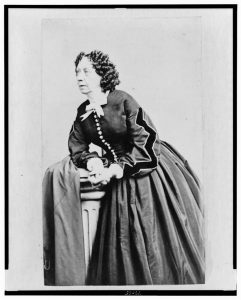
Sarah Willis Parton, more commonly known as Fanny Fern, was a famous and well-paid writer in the 19th century. Fern’s work gained attention because of the topics she addressed, and the manner in which she addressed them. She wrote to inform her audience of the reform that was needed in a multitude of areas in the 19th century. Fern focused on gender inequality, suffrage, divorce law, prison reform, and the poor. These themes are found throughout “Hungry Husbands,” “Male Criticism on Ladies’ Books,” and two chapters from Fern’s most famous piece, Ruth Hall. Although each piece differs in its own way, the voice she uses in all of her writing presents her ideas to her audience in a way that no one had seen before then.
Fanny Fern was not afraid to stand up for what she believed was right, and she did it with attitude. In “Hungry Husbands” Fern brings a whole new meaning to the stereotypical roles of a wife. In this piece she discusses the role of a wife to cook for her husband. But instead of making it a negative thing or a chore, Fern turns it around and notes says “the straightest road to a man’s heart is through his palate” (908). She basically tells women that they can outsmart their husband by asking for whatever they want right after they feed their husband. Although some of Fern’s work seems to bash on men, she still had a varied audience of both men and women.
In “Male Criticism on Ladies’ Books,” Fern addresses the male critics head on. Fern, never being one to shy away from confrontation, finally decided it was time to expose male critics for their unjustified critiques of women’s work. She described these men as cowards who hid behind their pen. Fern believed the motivation for much of their critiques was anger that women were publishing these things about men, and these men knew they were right. Their only defense was to harshly critique their work in an attempt to make them appear to not be credible.
Finally, Fanny Fern’s most famous work, Ruth Hall, discusses how her career as a woman writer came to be. She addresses the many struggles that not only she, but the majority of women writers, especially at the time, faced. Since she had very little encouragement from others, it took a lot of self-determination. She portrays self-determination when she says, “I can do it, I feel it, I will do it” (920). This is immediately after she is told that she is not good enough and that she will never make it as a writer. This shows how much Fanny Fern thrived off the doubt of others.
Fanny Fern was a very strong independent woman who was determined to complete whatever she put her mind to, no matter who or how many people told her she couldn’t. She became a role model for so many woman, and showed how the doubt of others can actually be the cause of strength and determination in the person they doubt. Fern also showed that standing up for certain things may cause backlash, but the backlash is worth getting out the important knowledge to the people who do care and the people who can help make a difference.
Works Consulted
Levine, Robert S., and Sarah Willis Parton. Fanny Fern. The Norton Anthology of American Literature. 1820-1865, B, W. W. Norton & Company, 2017, pp. 905–920.